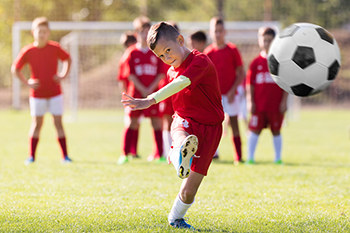(410) 764-7044
6506 Reisterstown Road, Baltimore
1205 York Road, Lutherville
6305 Belair Road, Baltimore
7809 Wise Avenue, Dundalk
Causes and Treatment of Sever’s Disease
Tuesday, 22 November 2022 00:00
In the first few years of a child’s life, the bones in their feet develop from soft areas of cartilage, known as growth plates. Once the growth plate fully develops, the bones do not grow any further. The heel bone grows until about the age of 15. A child between the ages of 9 and 15 who is physically active may develop a condition known as Sever’s disease. This is simply an imbalance between the growth of the heel bone and the soft tissue. The result is pain around the heel, which is made worse by running or standing on tiptoes. It is nearly impossible to detect Sever’s disease from an X-ray, but the symptoms usually are enough to make an accurate diagnosis. Relief from Sever’s disease comes from ceasing the activity that caused it and resting the foot. Heel pads and splinting at night can help to reduce the pain. For more information about Sever’s disease, please check with a podiatrist.
Sever's disease often occurs in children and teens. If your child is experiencing foot or ankle pain, see one of our podiatrists from Plaza Podiatry. Our doctors can treat your child’s foot and ankle needs.
Sever’s Disease
Sever’s disease is also known as calcaneal apophysitis, which is a medical condition that causes heel pain I none or both feet. The disease is known to affect children between the ages of 8 and 14.
Sever’s disease occurs when part of the child’s heel known as the growth plate (calcaneal epiphysis) is attached to the Achilles tendon. This area can suffer injury when the muscles and tendons of the growing foot do not keep pace with bone growth. Therefore, the constant pain which one experiences at the back of the heel will make the child unable to put any weight on the heel. The child is then forced to walk on their toes.
Symptoms
Acute pain – Pain associated with Sever’s disease is usually felt in the heel when the child engages in physical activity such as walking, jumping and or running.
Highly active – Children who are very active are among the most susceptible in experiencing Sever’s disease, because of the stress and tension placed on their feet.
If you have any questions, please feel free to contact our offices located in Baltimore, Lutherville, and Dundalk, MD . We offer the newest diagnostic and treatment technologies for all your foot and ankle injuries.




